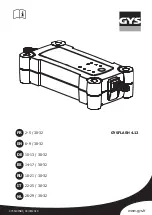
R
ESP
®
(Electronic Stability Program)
(
Y
page 66)
R
EBD (Electronic Brake force Distribution)
(
Y
page 69)
R
ADAPTIVE BRAKE (
Y
page 70)
R
PRE-SAFE
®
Brake (
Y
page 70)
Important safety notes
If you fail to adapt your driving style or if you
are inattentive, the driving safety systems can
neither reduce the risk of accident nor over-
ride the laws of physics. Driving safety sys-
tems are merely aids designed to assist driv-
ing. You are responsible for the distance to
the vehicle in front, for vehicle speed and for
braking in good time. Always adapt your driv-
ing style to suit the prevailing road, weather
and traffic conditions and maintain a safe dis-
tance from the vehicle in front. Drive care-
fully.
i
The driving safety systems described only
work as effectively as possible when there
is adequate contact between the tyres and
the road surface. Please pay special atten-
tion to the notes on tyres, recommended
minimum tyre tread depths, etc.
(
Y
page 354).
In wintry driving conditions, always use
winter tyres (M+S tyres) and, if necessary,
snow chains. Only in this way will the driv-
ing safety systems described in this section
work as effectively as possible.
ABS (Anti-lock Braking System)
Important safety notes
i
Observe the "Important safety notes" sec-
tion (
Y
page 64).
G
WARNING
If ABS is faulty, the wheels could lock when
braking. The steerability and braking charac-
teristics may be severely impaired. Addition-
ally, further driving safety systems are deac-
tivated. There is an increased danger of skid-
ding and accidents.
Drive on carefully. Have ABS checked imme-
diately at a qualified specialist workshop.
When ABS is malfunctioning, other systems,
including driving safety systems, will also
become inoperative. Observe the information
on the ABS warning lamp (
Y
page 279) and
display messages which may be shown in the
instrument cluster (
Y
page 250).
ABS regulates brake pressure in such a way
that the wheels do not lock when you brake.
This allows you to continue steering the vehi-
cle when braking.
ABS works from a speed of about 8 km/h
upwards, regardless of road-surface condi-
tions. ABS works on slippery surfaces, even
when you only brake gently.
The yellow
!
ABS warning lamp in the
instrument cluster lights up when the ignition
is switched on. It goes out when the engine is
running.
Brakes
X
If ABS intervenes: continue to depress the
brake pedal with force until the braking sit-
uation is over.
X
To make a full brake application:
depress the brake pedal with full force.
If ABS intervenes when braking, you will feel
a pulsing in the brake pedal.
The pulsating brake pedal can be an indica-
tion of hazardous road conditions and func-
tions as a reminder to take extra care while
driving.
BAS (Brake Assist System)
i
Observe the "Important safety notes" sec-
tion (
Y
page 64).
64
Driving safety systems
Safety
Summary of Contents for CLS 2012
Page 2: ......
Page 3: ......
Page 5: ......
Page 29: ...26...
Page 99: ...96...
Page 227: ...224...
Page 292: ...Useful information 290 Stowage areas 290 Features 303 289 Stowing and features...
Page 321: ...318...
Page 322: ...Useful information 320 Engine compartment 320 Service 324 Care 325 319 Maintenance and care...
Page 355: ...352...
Page 403: ...400...
Page 404: ......
Page 405: ......
















































